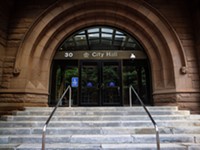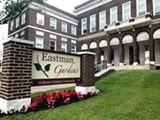[
{
"name": "500x250 Ad",
"insertPoint": "5",
"component": "15667920",
"parentWrapperClass": "",
"requiredCountToDisplay": "1"
}
]
News from Washington this week is dominated by the Republicans' health-care bill and the impact it would have, particularly on poor and low-income Americans. That's not the only threat, however. Still to come: the federal budget. Many of the cuts proposed by President Donald Trump are aimed straight at the least affluent Americans and their communities.
The real budget decisions are made by the members of Congress, not the president. They have until September to act, and they haven't released their plans yet. But while they're not likely to give the president everything he wants, many Republicans dislike the same programs the Trump administration does.
A major concern locally: Trump's proposal to eliminate the Community Development Block Grant Program, which for decades has helped low- and moderate-income people pay for repairs to their homes, helped small neighborhood businesses improve, and helped cities like Rochester demolish vacant buildings.
Two Rochester suburbs, Irondequoit and Greece, have received CDBG funding, too. Irondequoit has been receiving about $820,000 in CDBG money each year for the past few years, says Town Supervisor David Seeley. Most of that has been used for home-improvement grants, Seeley says, but CDBG money has also helped the town pay for road and sidewalk repairs in low-income neighborhoods, and it has been invested in the town's senior center, food cupboard, and a senior transportation program.
Rochester officials cite numerous examples of CDBG aid over the past two years. The money has helped finance:
• Emergency repairs and replacement of furnaces and hot water tanks for 143 homeowners;
• Lead-based paint remediation for 47 homeowners and landlords;
• General home repairs for 30 homeowners and major rehabilitation for 45 homeowners and landlords;
• Demolition of 203 properties;
• Assistance for 320 homeowners so they could avoid foreclosures due to mortgage default, predatory loans, or tax default;
• Installation of grab bars, hand rails, and other aids, helping 150 senior homeowners remain in their homes;
• Legal help, counseling, a housing hotline, and other aid to help 400 households avoid eviction from their apartments;
• Legal assistance with such things as wills and estates, elder abuse problems, fraud, and access to medical services for 35 senior households;
• Funding for the Home Rochester program, which acquires foreclosed single-family houses, rehabilitates them, and sells them to qualified low- and moderate-income Rochesterians;
• Loans and grants to assist 96 city businesses.
"The loss of CDBG funding would hurt the most vulnerable citizens not just in Rochester but across the country," said city press officer Jessica Alaimo. "Many Rochester households have limited income, including senior citizens who depend on Social Security benefits as their primary source of income."
"There is little disposable income among this population to make home repairs and deferred maintenance increases each year," Alaimo said. "The CDBG Program is essential to the continuation of housing services to families most in need."
The City of Rochester has also received millions of dollars through the federal Home Investment Partnerships Program, known as HOME. The program has funded numerous housing efforts for low-income Rochesterians, not only helping the residents themselves but also improving the quality of affordable housing in city neighborhoods.
Over the last two years, officials say, the City has used HOME funds to:
• Help 177 households with down payments and closing costs;
• Pay for training in home ownership for 177 households;
• Rehabilitate and sell 51 vacant or foreclosed single-family homes to first-time homeowners;
• Help with the construction of three affordable-housing apartment complexes: Stadium Estates in northwest Rochester, Eastman Gardens on East Main Street, and Wedgepoint in the South Wedge. The City's $1.3 million in HOME funds resulted in a total public-private investment of more than $47 million.
If Rochester loses HOME funding, Alaimo said, it would seriously harm the city's ability to keep making investments in city neighborhoods and their low- and moderate-income residents.
Speaking of...
-

Warren releases $552 million city budget plan
May 18, 2019 -

Republicans' tax plan as a nation-shaper
Dec 5, 2017 -

Urban Action 5/31
May 31, 2017 - More »
Latest in News
More by Mary Anna Towler
-

Police reform: advocates on what should come next
Oct 22, 2019 -

Court clears the way for Police Accountability referendum
Oct 17, 2019 -

Dade outlines initial actions on district deficit
Oct 9, 2019 - More »






